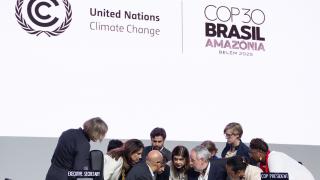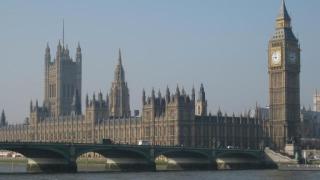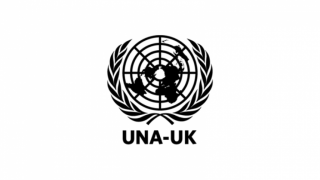
UNA-UK CEO Jane Kinninmont writes on the recently concluded COP30 meeting in Belém, Brazil. Watch Jane’s reaction via the Disorder Podcast here.
COP30, the world’s biggest gathering to tackle climate change, has concluded. So what did this massive meet-up in the Amazon actually achieve?
It could have been worse. Much worse—given that the current position of the US government, the world’s single largest economy and most important power, is to deny that man-made climate change is real, despite all the science.
It is therefore particularly important that this year, every other country in the world has signed up to a collective reaffirmation of the scientific consensus and the need to maintain the Paris Treaty’s most famous target: to limit global warming to 1.5 degrees. In stark contrast to the work of the Security Council on international peace and security, the UN’s work on climate isn’t subject to great power vetoes. This is also important for how we think about the design of future UN initiatives.
The engagement of many Americans who speak for cities or for businesses was also notable at COP30, underlining the need to think beyond heads of state when looking for climate leadership.
So—the world has held the line on climate change. But it hasn’t really gone beyond that, despite the importance and urgency of the situation. This year’s COP in Brazil has ended with a statement that seems to add little to previous years’ agreements.
This outcome raises questions about the value of having such a huge annual jamboree for heads of state, diplomats, businesses, civil society and everyone else involved in the COP throng of some 60,000 people, if they are primarily coming together to restate existing positions.
Some countries came to the COP with big ambitions to agree a timescale for phasing out fossil fuels and to make concrete plans to stop deforestation – which is linked to the world’s ability to mitigate climate change as forests help absorb carbon emissions, but are also at risk when climate change drives wildfires. Others – mainly the oil producers, like Russia and Saudi Arabia – were more interested in editing the phrase “fossil fuels” out of the closing statement. You couldn’t make it up.
That’s just one example of how the traditional multilateral practice of agreeing joint statements between all the countries involved is getting increasingly difficult. Global consensus on climate matters.
But the world can’t be held back by waiting for the slowest and most reluctant—which is always a risk when seeking consensus. So, some countries have agreed to go further with specific initiatives.
Notably, some 80 countries formed a coalition of the willing to agree a roadmap for phasing out fossil fuels, and another voluntary partnership was agreed to tackle deforestation. This is well below the original ambitions of Brazil’s presidency and means global action on climate is going to be much slower and patchier than it should be. Much more work needs to be done to incentivise other countries to do their part.
Putting decision makers in a room, not just a Zoom, does matter for any efforts to move things forward, and take joint decision-making beyond the repetition of policies everyone had before they came. It also needs to be backed up with serious pressure on governments from below—from civil society, voters, businesses—so it’s important that disappointment doesn’t translate into disengagement.
Image: Discussion at the Closing Plenary session of COP30. Credit: UN Climate Change/ Kiara Worth. Licence CC BY-NC-SA 4.0.






